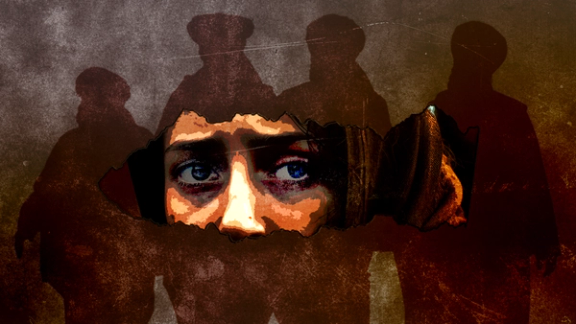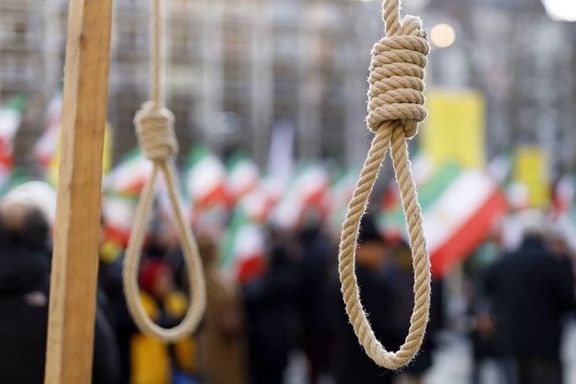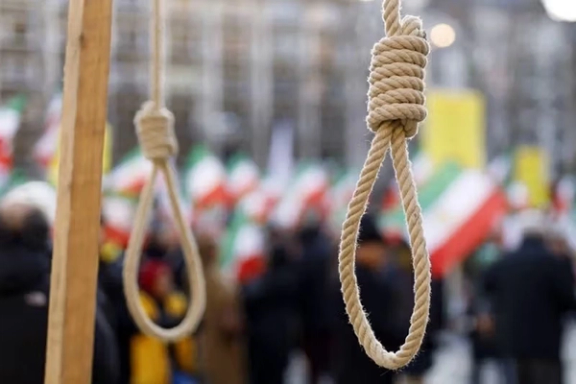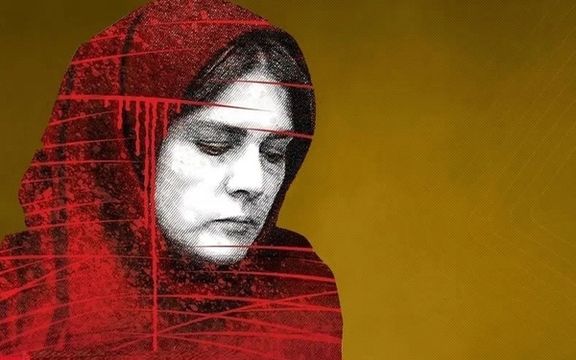How the Taliban rape and terrorize women in custody



At least 110 people were executed in Iran in April, bringing the total number of the year to 343, a 75% increase compared to the same period in 2024, according to Oslo-based rights group Iran Human Rights (IHR).
Of those, 169 were for drug-related offences, 153 for murder, 12 for security-related charges, and nine for rape.
Among those executed in April on security-related charges, seven were accused of ties to dissident political or religious groups, and one was accused of espionage for Israel.
Only two of the April executions were officially announced by the Iranian authorities.
Iran accounted for 64% of all known global executions in 2024, with at least 972 people executed, according to Amnesty International.
On Saturday, over 300 global figures—including UN experts, Nobel laureates, former ambassadors, judges, and human rights leaders— issued an urgent appeal for United Nations intervention to stop what they called a “campaign of politically motivated executions” in Iran.

A 19-year-old man was killed after being shot twice in the head by police during a confrontation at a beach in northern Iran, the Norway-based Hengaw rights group reported.
Sahel Nasiri and his friend Benyamin Gholami were approached by police for a body search and an attempt to confiscate their motorcycle on Friday evening at Zibakenar Beach in Iran’s Gilan province, Hengaw’s report said, according to local sources.
When Nasiri resisted and tried to mount the vehicle, officers shot him twice in the head at close range, killing him.
Nasiri’s body was transferred to the local police station that night, and his friend Gholami was taken into custody, the report said.
Gilan province police said Nasiri and another motorcyclist had been carrying crystal meth, marijuana, and hashish. They said he tried to disarm officers and was “neutralized” after a warning shot failed to stop him.
Nasiri’s death triggered protests by residents of Zibakenar, who set fire to banners on the local police station, according to Hengaw.
The rights group said the demonstrations ended after security forces stormed the area and clashed with protesters.
Nasiri’s body was handed over to his family following hours of protests and threats from authorities and was buried in his hometown on Saturday, the group added.

Over 300 global figures—including UN experts, Nobel laureates, former ambassadors, judges, and human rights leaders—have issued an urgent appeal for United Nations intervention to stop what they call a “campaign of politically motivated executions” in Iran.
The joint statement, signed by a wide range of international voices, condemned Tehran’s judicial handling of political prisoners and called on democratic governments and UN bodies to act swiftly.
The appeal centers on the cases of Behrouz Ehsani, 69, and Mehdi Hassani, 48, whose death sentences were recently upheld by Iran’s Supreme Court.
The statement described their prosecution as a sham: “Their kangaroo trial on 10 August 2024, lasting just five minutes, was a travesty of justice: they were denied legal counsel for nearly two years, tortured, and silenced during proceedings.”
The charges include “membership in the exiled opposition group Mujahedin-e Khalq Organization” and “propaganda,” framed as “enmity against God” and “corruption on earth” under Iran’s legal code.
“We demand an immediate halt to their execution,” the signatories wrote. “The international community must not remain silent.”
The group also warned of a broader execution drive under President Masoud Pezeshkian, who took office in August 2024. Since then, more than 1,000 executions have been carried out, disproportionately targeting women, juveniles, ethnic and religious minorities, and political dissenters. Several prisoners, including Abolhassan Montazer and Sharifeh Mohammadi, have already been moved to Ghezel Hesar Prison—described in the statement as “a notorious execution site.”
The appeal highlights findings by former UN Special Rapporteur Javaid Rehman, whose July 2024 report concluded that mass killings in Iran in 1981–82 and 1988 amounted to crimes against humanity and genocide. “The Iranian authorities’ systematic targeting of political prisoners is rooted in a culture of impunity,” the joint statement said.
They called on the UN and democratic governments to “identify and sanction Iranian officials responsible for human rights violations” and to tie future relations with Iran to the release of political prisoners and abolition of the death penalty.
Iran accounted for 64% of all known global executions in 2024, with at least 972 people executed, according to Amnesty International.

Iran's government has announced the withdrawal of a critical draft law on violence against women from parliament after hardliners watered it down, dealing a new setback to women's rights in the theocracy.
The bill—originally proposed by former President Hassan Rouhani’s administration—was intended to strengthen protections for women by increasing penalties for physical abuse and providing support services for victims.
But modifications by hardline lawmakers have significantly altered the bill’s core principles, leading the government to abandon the effort.
Hardline lawmakers replaced the term “violence” with “ill-behavior” throughout the draft bill and its title from “Safeguarding Women’s Dignity and Protecting them Against Violence” to “Safeguarding Women’s Dignity and Supporting Women and Families”.
Unlike the original bill, the revised version does not propose increased penalties for a broad range of injuries inflicted on women—such as cuts, bruises, or other forms of bodily harm but only limits harsher punishments to cases involving dismemberment.
“We requested the draft bill to be withdrawn when we realized that (parliamentary committees) had changed the character and substance of the draft bill," Zahra Behrouz-Azar, President Masoud Pezeshkian’s Women’s Affairs Deputy.
"It no longer addresses prevention (of violence),” she told reporters on the sidelines of a cabinet meeting on Thursday.
Despite the government's decision, the hardline-dominated Parliament is likely to move ahead with its own version of the law, the chair of the Parliament’s Social Committee Zohrehsadat Lajevardi has indicated.
The draft bill now mandates the Ministry of Higher Education to create separate classrooms, study spaces, and even universities exclusively for women when the original draft called for interdisciplinary research programs and academic courses on violence prevention as well as to establish counseling centers for victims.
“One cannot expect support for women from a parliament that has approved an oppressive hijab law," Iranian journalist Mina Emamverdi argued in a post on X. "The functional incongruity is a sign of the lack of a structural understanding of gender-based violence.”
Legal gaps leave women vulnerable
Iran’s Sharia-based legal system has long been criticized for its discriminatory provisions against women, particularly in criminal and family law.
A glaring example is a law that exempts fathers – who legally own the right to the “blood” of their offspring – from the death penalty if they kill them. Another law allows a father to pardon his children’s killers, for the same reason, if he so chooses.
Such provisions have led to lenient sentences in many so-called honor killing cases.
In a particularly tragic case in February 2022, Mona Heydari, a 17-year-old mother of three, was beheaded by her husband in Ahvaz in southwestern Iran. The victim’s father had helped the husband, his nephew, to bring his daughter back from Turkey where she had fled after being refused a divorce.
Pardoned by the victim’s father, the husband who had proudly paraded her severed head on the street was sentenced to slightly over eight years in prison.
“The lack of deterrent laws, legal loopholes, and the father's escape from punishment make domestic violence a modest crime,” Iranian journalist Samira Rahi commented about the recent killing of an 18-year-old girl, Fatemeh Soltani, by her father in a post on X.
The young woman had allegedly revealed her father’s infidelity to her mother, also a victim of domestic violence.
Under current laws, the father could face a maximum of ten years in prison.
Long journey of the proposed bill
The fourteen-year delay in presentation of the bill, first proposed by former President Mahmoud Ahmadinejad’s administration and finally submitted to the Parliament by Rouhani’s government in 2021, reflects the broader tensions between maintaining cultural and religious norms and protecting women’s rights.
Iran’s Supreme Leader, Ali Khamenei, weighed in on the issue in 2017. While condemning violence against women, he warned that government and parliament officials should be careful not to follow Western values in such matters.
“(Saying) it is violence if a father interferes in a daughter’s marriage (by not allowing it), for example … What is violence and what is not violence should not be learned from the West; it should be understood from our own rational logic, from our own Islamic belief.”
As noted by former UN Human Rights Rapporteur Javaid Rahman, the bill had significant shortcomings despite some positive measures.
These, Rahman said, included a lack of comprehensive definitions of various forms of abuse such as psychological and economic violence and exclusion of marital rape and child marriage.
Rahman also warned over a provision requiring a period of mandatory mediation in domestic violence cases which could place victims in even greater danger before action was taken against alleged perpetrators.

A new marketing display by Iranian brand My Lady featuring transparent packaging for sanitary pads has ignited online debate, revealing the deep cultural discomfort still surrounding menstruation in Iran.
The display, first posted by a user on the social media platform X last week, showed a row of pads visible in see-through folders—an abrupt break from the longstanding norm of black plastic bags and whispered requests at the counter.
The post quickly surpassed one million views and gathered thousands of likes and shares. “From black plastic to product albums to help us choose better. What a path we’ve come, woman!” wrote one user, who reposted the image with commentary that resonated widely.
Others joined the conversation with similar stories of resisting the imposed shame around buying menstrual products in public.
The marketing choice—practical on its face—has gained symbolic weight in a country where women’s bodies are policed not just through law but through entrenched taboos.
“Seven years ago, when My Lady launched its maxi pads, we had to secretly open samples for customers,” wrote a user identifying as a company marketer. “The store manager scolded us, said it was shameless. So we made a discreet booklet with three samples stuck inside—like contraband.”
The move to make pads visibly accessible in stores echoes moments from the 2022 protests, when women were photographed covering surveillance cameras in Tehran’s subway with sanitary pads—turning a product once treated as unmentionable into a symbol of defiance.
That imagery reinforced a broader shift: menstruation was no longer something to be hidden, but something women could use—literally and figuratively—to resist.
In a post viewed more than 800 times, another X user described how, in smaller towns, buying pads still carries a strong social stigma. “I’d say put it in a regular bag, and I’d relish the look on the seller’s face,” she wrote. “You could see them thinking, ‘How shameless the new generation has become.’ It was deeply satisfying.”
That stigma, rooted in religious and patriarchal frameworks, frames menstruation as impure. Across various cultures with strong religious influences, menstruating women are often deemed unclean and barred from certain spaces. The expectation is silence—both about the blood and the discomfort.
In Iran, where the Islamic Republic’s laws tightly govern gender expression and public morality, that silence is rigorously enforced.
Still, the shift is underway. A handful of men have joined the conversation online, recalling how they were dispatched to buy pads to shield female relatives from embarrassment.
“I’d run home with the black bag, praying no one saw me,” one wrote. But others mocked the change, reflecting a lingering cultural divide. Of 84 replies under one widely shared post, 11 came from male accounts opposing the visibility initiative.
The company behind the display, My Lady, has previously drawn official backlash. In March, following the release of a video marking International Women’s Day—one that referenced women’s exclusion from stadiums and legal rights—their Instagram page was taken down. Still, the public rallied, citing the brand’s decade-long focus on education and taboo-breaking.
The rise of transparent packaging may not end the stigma, but its presence in plain sight signals a societal reckoning.
The journey from hushed exchanges to open acknowledgment continues, carried forward by a generation of women unwilling to be hidden.